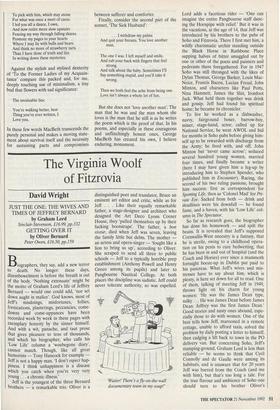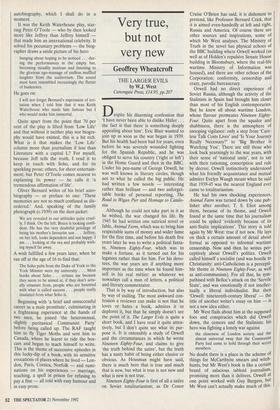The Virginia Woolf of Fitzrovia
David Wright
JUST THE ONE: THE WIVES AND TIMES OF JEFFREY BERNARD by Graham Lord Sinclair-Stevenson, f16.99, pp.332 GETTING OVER IT by Oliver Bernard Peter Owen, f16.50, pp.159 Biographers, they say, add a new terror to death. No longer: these days, disembowelment is before the breath is out of the body. 'Nothing extenuate' might be the motto of Graham Lord's life of Jeffrey Bernard — would one could add, 'nor set down aught in malice'. God knows, most of Jeff's misdoings, misfortunes, follies, fornications, plasterings, peccancies, come- downs and come-uppances have been recorded week by week in these pages with exemplary honesty by the sinner himself. And with a wit, panache, and taut prose that gives pleasure to tens of thousands, and which his biographer, who calls his 'Low Life' column a 'woebegone diary', cannot match. Though, like all great humorists — Tony Hancock for example Jeff is not a happy man. 'I don't expect hap- piness. I think unhappiness is a disease which you catch when you're very very young ... a chronic illness.'
Jeff is the youngest of the three Bernard brothers — a remarkable trio. Oliver is a distinguished poet and translator, Bruce an eminent art editor and critic, while as for Jeff . . . Like their equally remarkable father, a stage-designer and architect who designed the Art Deco Lyons Corner House, they 'pulled themselves up by their fucking bootstraps'. The father, a bon viveur, died when Jeff was seven, leaving the family little but debts. The mother an actess and opera-singer — 'fought like a lion to bring us up', according to Oliver. She scraped to send all three to public schools — Jeff to a typically horrible prep establishment (Anthony Powell and Henry Green among its pupils) and later to Pangbourne Nautical College. At both places the discipline was sadistic. Jeff could never tolerate authority, so was expelled.
'Waiter! There's a fly-on-the-wall documentary team in my soup!' Lord adds a facetious rider — 'One can imagine the entire Pangbourne staff danc- ing the Hornpipe with relief.' But it was in the vacations, at the age of 14, that Jeff was introduced by his brothers to the pubs of Soho and Fitzrovia. There I first met him, a wildly charismatic urchin standing outside the Black Horse in Rathbone Place supping halves of bitter smuggled out by one or other of the poets and painters and pederasts there foregathered. For in 1947 Soho was still thronged with the likes of Dylan Thomas, George Barker, Louis Mac- Neice, Francis Bacon, Lucian Freud, John Minton, and characters like Paul Potts, Nina Hamnett, James the Shit, Ironfoot Jack. What held them together was drink and gossip. Jeff had found his spiritual home; he became its chronicler.
To live he worked as a dishwasher, navvy, fairground boxer, barrow-boy, miner, stage-hand, actor; called up for National Service, he went AWOL and hid for months in Soho pubs before giving him- self up to be rewarded with discharge from the Army; he lived with, and off, John Minton but 'never came across'; seduced several hundred young women, married four times, and finally became a writer (here I may have given him a leg-up by introducing him to Stephen Spender, who published him in Encounter). Racing, the second of his two ruling passions, brought him success: first as correspondent for Sporting Life, then as 'Colonel Mad' for Pri- vate Eye. Sacked from both — drink and deadlines were his downfall — he found fame, and a haven, with his 'Low Life' col- umn in The Spectator.
So far as research goes, the biographer has done his homework — and spilt the beans. It is revealed that Jeff's supposed Cornwallis-West ancestry is a fantasy, that he is sterile, owing to a childhood opera- tion on his penis to cure bedwetting, that he has been in and out of hospital (and the Coach and Horses) ever since a mammoth fortnight booze-up in Dublin put paid to his pancreas. What Jeff's wives and mis- tresses have to say about him, which is plenty, is here set down for all to read. One of them, talking of meeting Jeff in 1949, throws light on his charm for young women: 'He was the James Dean type, sulky ... He was James Dean before James Dean. Jeffrey was the first James Dean.' Good stories and nasty ones abound, espe- cially those to do with women. One of the best tells how Jeff, marooned in a remote cottage, unable to afford taxis, solved the problem by daily posting a letter to himself, then cadging a lift back to town in the PO delivery van. But concerning Soho, Jeff's stamping-ground, Graham Lord is less than reliable — he seems to think that Cyril Connolly and de Gaulle were among its habitués, and is unaware that for 20 years Jeff was barred from the Coach (and me with him), but that's too long a tale. For the true flavour and ambience of Soho one should turn to his brother Oliver's autobiography, which I shall do in a moment.
It was the Keith Waterhouse play, star- ring Peter O'Toole — who by then looked more like Jeffrey than Jeffrey himself that made him an international celebrity. It solved his pecuniary problems — the biog- rapher draws a snide picture of his hero
hanging about hoping to be noticed . . . dur- ing the performances in the empty bar, becoming steadily stocious and listening to the glorious ego-massage of endless muffled laughter from the auditorium. The sound must have resembled increasingly the flutter of banknotes.
He goes on: I will not forget Bernard's expression of irri- tation when I told him that it was Keith Waterhouse who made him famous but I who would make him immortal.
Quite apart from the point that 70 per cent of the play is lifted from 'Low Life' and that without it neither play nor biogra- phy would have existed, this is a bit rich. What is it that makes the 'Low Life' column more than journalism if less than Literature with a capital L? For myself, because Jeff tells the truth, I read it to keep in touch with Soho, and for its sparkling prose; others, for sheer entertain- ment; but Peter O'Toole comes nearest to explaining its power — he calls it 'a tremendous affirmation of life'.
Oliver Bernard writes of his brief auto- biography — or preface to one: 'These memories are not so much confused as dis- ordered.' And, speaking of the family photograph (c.1939) on the dust-jacket:
We are revealed in our attitudes quite cruel- ly, I think. On the left, Bruce is looking confi- dent. He has the very doubtful privilege of being his mother's favourite son . . . Jeffrey, on her left, looks dependent and not happy. I am . . . looking at the sea and probably wish- ing myself far away.
A wish fulfilled a few years later, when he ran off at the age of 16 to find that:
The Soho pubs from the Duke of York to the York Minster were my university . . . Most books about Soho . . . irritate me because they seem to be aimed at, if they don't actu- ally emanate from, people who are besotted with what is called success . . . people really insulated from what Soho is.
Beginning with 'a brief and unsuccessful career as a male prostitute', culminating in a frightening experience at the hands of two men, he joined 'the heterosexual, slightly puritanical Communist Party' before being called up. The RAF taught him to fly Tiger Moths and sent him to Canada, where he learnt to ride the box- cars and began to teach himself to write. This is the theme of successive episodes in this lucky-dip of a book, with its sensitive evocations of places where he lived — Lon- don, Paris, Corsica, Norfolk — and rumi- nations on his experiences — marriage, teaching, a spell in prison for refusing to pay a fine — all told with easy humour and in easy prose.











































































 Previous page
Previous page